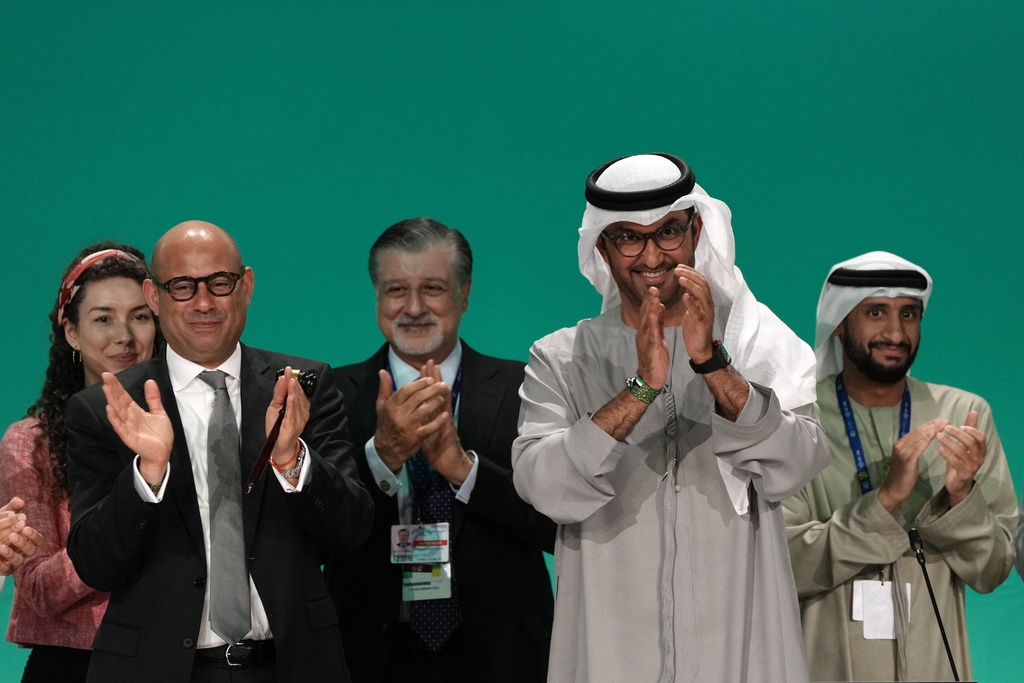DUBAI, United Arab Emirates — Nearly 200 countries agreed Wednesday to move away from planet-warming fossil fuels — the first time they’ve made that crucial pledge in decades of U.N. climate talks though many warned the deal still had significant shortcomings.
The agreement was approved without the floor fight many feared and is stronger than a draft floated earlier in the week that angered several nations. But it didn’t call for an outright phasing out of oil, gas and coal, and it gives nations significant wiggle room in their “transition” away from those fuels.
“Humanity has finally done what is long, long, long overdue,” Wopke Hoekstra, European Union commissioner for climate action, said as the COP28 summit wrapped up in Dubai.
Within minutes of opening Wednesday’s session, COP28 President Sultan al-Jaber gaveled in approval of the central document — an evaluation of how off-track the world is on climate and how to get back on — without giving critics a chance to comment. He hailed it as a “historic package to accelerate climate action.”
Support our partnership with nonprofit Associated Press. Give today
The document is the central part of the 2015 Paris accord and its internationally agreed-upon goal to try to limit warming to 1.5 degrees Celsius (2.7 degrees Fahrenheit) above pre-industrial times. The goal is mentioned 13 times in the document and al-Jaber repeatedly called that his “North Star.” So far, the world has warmed 1.2 degrees (2.2 degrees Fahrenheit) since the mid 1800s. Scientists say this year is all but certain to be the hottest on record.
Several minutes after al-Jaber rammed the document through, Samoa’s lead delegate Anne Rasmussen, on behalf of small island nations, complained that they weren’t even in the room when al-Jaber said the deal was done. She said that “the course correction that is needed has not been secured,” with the deal representing business-as-usual instead of exponential emissions-cutting efforts. She said the deal could “potentially take us backward rather than forward.”
When Rasmussen finished, delegates whooped, applauded and stood, as al-Jaber frowned, eventually joining the standing ovation that stretched longer than his plaudits. Marshall Islands delegates hugged and cried.
“I am in awe of the spirit of cooperation that has brought everybody together,” United States Special Envoy John Kerry said. He said it shows that nations can still work together despite what the globe sees with wars in Ukraine and the Middle East. “This document sends very strong messages to the world.”
United Nations Secretary-General Antonio Guterres said in a statement that “for the first time, the outcome recognizes the need to transition away from fossil fuels.”
“The era of fossil fuels must end — and it must end with justice and equity,” he said.
United Nations Climate Secretary Simon Stiell told delegates that their efforts were “needed to signal a hard stop to humanity’s core climate problem: fossil fuels and that planet-burning pollution. Whilst we didn’t turn the page on the fossil fuel era in Dubai, this outcome is the beginning of the end.”
Stiell cautioned people that what they adopted was a “climate action lifeline, not a finish line.”
The new deal had been floated early Wednesday and was stronger than a draft proposed days earlier, but had loopholes that upset critics.
“The problem with the text is that it still includes cavernous loopholes that allow the United States and other fossil fuel producing countries to keep going on their expansion of fossil fuels,” Center for Biological Diversity energy justice director Jean Su told The Associated Press. “There’s a pretty deadly, fatal flaw in the text, which allows for transitional fuels to continue” which is a code word for natural gas that also emits carbon pollution.
Goals agreed at earlier summits have not been reached, in part because major emitters have not fulfilled their climate promises, or have declined to sign on.
The deal also calls for tripling the use of renewable energy and doubling energy efficiency. Earlier in the talks, the conference adopted a special fund for poor nations hurt by climate change and nations put nearly $800 million in the fund.
The deal doesn’t go so far as to seek a “phase-out” of fossil fuels, despite the pleas of more than 100 nations including small island states and European nations. Instead, it calls for “transitioning away from fossil fuels in energy systems, in a just, orderly and equitable manner, accelerating action in this critical decade.”
In a press conference, Kerry called it “a clear unambiguous message on one of the most complicated issues that we face.” He said the United States wanted stronger language, but it was too much “of a steep climb” to get from 195 nations.
He said “there were times in the last 48 hours where some of us thought this could fail.” But “we stayed at it. People showed good faith. People stepped up.”
___
Associated Press journalists David Keyton, Jamey Keaten, Sibi Arasu, Jon Gambrell, Malak Harb and Bassam Hatoum contributed to this report.


